- Home
- Simon Beckett
The Calling of the Grave Page 2
The Calling of the Grave Read online
Page 2
Black Tor.
Dartmoor had more impressive tors - outcrops of weathered rock that rose from the moorland like carbuncles - but Black Tor's wind- sculpted profile was unmistakable against the skyline. It sat on top of a low escarpment, a broad, squat tower, as though a giant child had stacked flattened boulders one on top of the other. It didn't look any blacker than any of the other tors I'd seen, so perhaps the name was down to some dark event in its past. But it sounded suitably portentous, the sort of detail the newspapers would gleefully seize on.
Especially if it was Jerome Monk's graveyard.
After Simms' telephone call I'd searched the internet for background to the case. Monk had been a journalist's dream. A misfit and loner who supplemented his precarious living as a casual labourer with poaching and theft, he was an orphan whose mother had died during his birth, leading some of the more lurid tabloids to claim that she'd been his first victim. He was often described as a gypsy, but that wasn't true. While he'd lived most of his life around Dartmoor in a caravan, he'd been shunned by the local traveller population as well as the rest of society. Unpredictable and prone to outbursts of terrifying violence, his personality matched his exterior.
If anyone looked the part of a murderer, it was Monk.
Freakishly strong, he was a physical grotesque, a sport of nature.
The photographs and footage from his trial showed a hulk of a man, whose bald cannonball of a skull housed deep-set, sullen features. His black, button eyes glinted with all the expression of a doll's above a mouth that seemed curved in a permanent sneer. Even more unsettling was the indentation on one side of his forehead, as though a giant thumb had been pressed into a ball of clay. It was disturbing to see, the sort of disfigurement that looked as if it should have been fatal.
To most people's minds it was a pity it wasn't.
It wasn't so much the nature of his crimes that had been so shocking, though that was bad enough. It was the sadistic pleasure he seemed to take in selecting vulnerable victims from the Dartmoor area. The first, Zoe Bennett, was a dark-haired and pretty seventeen- year-old, an aspiring model who never returned home after leaving a nightclub one evening. Three nights after that a second girl disappeared.
Lindsey Bennett, Zoe's identical twin.
What had been a routine missing persons investigation suddenly became front-page news. No one doubted that the same individual was responsible, and when Lindsey's handbag was discovered in a rubbish bin, effectively ending any hope that the sisters were still alive, there was public outrage. Bad enough for a family to suffer that sort of loss once, but twice? And twins?
When Tina Williams, an attractive, dark-haired nineteen-year-old, went missing as well, it sparked the inevitable false alarms and hysteria. For a time it seemed there was a definite lead: a white saloon car was picked up on street CCTV cameras and reported by witnesses in the areas where both Lindsey Bennett and Tina Williams had last been seen.
Then Monk claimed his fourth victim, and for ever sealed his reputation as a monster. At twenty-five, Angela Carson was older than the others. Unlike them she was neither dark-haired nor pretty. There was also a more significant difference.
She was profoundly deaf and couldn't speak.
Afterwards, neighbours described hearing Monk's laughter as he'd raped her and battered her to death in her own flat. When the two policemen who responded to the 999 calls broke down her door they found him with her body in the wrecked bedroom, bloodied and crazed. They were big men, yet he'd beaten them both unconscious before disappearing into the night.
And then, apparently, off the face of the earth.
Despite one of the largest manhunts in UK history, no sign of Monk was found. Or of either the Bennett twins or Tina Williams. A search found a hairbrush and a lipstick belonging to Zoe Bennett hidden under his caravan, but not the girls themselves. It was three months before Monk was seen again, spotted by the side of a road in the middle of Dartmoor. Filthy and reeking, he made no attempt to resist arrest, or to deny his crimes. At his trial he pleaded guilty to four counts of murder, but refused to reveal either where he'd been hiding or what he'd done with the missing girls' bodies. The popular theory was that he'd buried them out on the moor before going to ground there himself. But Monk just smiled his contemptuous smile and said nothing.
With the killer behind bars, the story faded from the public eye, the missing girls just more victims whose fates were unknown.
That might be about to change.
Standing out like a beacon on the drab moorland was a bright blue forensic tent. It was roughly halfway between the road and the rock formation, a short distance off to one side of the rugged dirt track that linked the two. I stood for a moment in the fine drizzle, breathing in the fecund scent of wet peat as I wondered what I'd find inside.
Then I set off along the track towards it.
* * *
Chapter 2
A corridor of police tape had been strung from the midway point of the track out to the forensic tent. The moor had been churned into black mud by the constant tramp of feet, and my boots squelched as I walked between the parallel lines of flapping tape. The area around the tent had been cordoned off, and a uniformed dog- handler stood guard at the opening. He shifted from foot to foot to keep warm as he and the dog, a German Shepherd, watched me approach.
'I'm here to see DCS Simms,' I said, a little out of breath.
Before he could say anything the tent flap was thrown back and a man appeared in the gap. He was in his forties but seemed to aspire to be older. His face was remarkably unlined, and as if to offset the blandness of his features he'd cultivated a moustache that gave him a military bearing. The white overalls he wore somehow didn't look right on him. He'd pushed back the protective hood, and the black hair beneath it had managed to stay so neatly combed it looked moulded.
'Dr Hunter? I'm Simms.'
I'd have guessed as much even if I hadn't recognized his voice. It was peremptory and officious, confident in its authority. His pale eyes flicked over me and in that moment I felt that, for better or worse, I'd been swiftly assessed.
'We were expecting you half an hour ago,' he said, before disappearing back inside.
Nice to meet you, too. The dog-handler moved aside to let me through, tightening his grip on the dog's harness. But I was uncomfortably aware of the German shepherd's unblinking stare as I went past them and into the tent.
After the open space of the moor it seemed cramped and crowded inside, a confusion of overalled figures. The diffused light from the blue walls had an ethereal quality. The atmosphere was moist and clammy, with a mustiness disconcertingly evocative of camping. Beneath it was another odour, of freshly turned soil and something far less benign.
The grave was in the centre.
Portable floodlights had been set up around it, steaming slightly in the damp air. Metal stepping plates had been put down around a rectangle of dark peat, framed by a grid of string. Someone I took to be a SOCO knelt over it, a big man who held his gloved hands poised in the air like a surgeon interrupted in theatre. In front of him, a muddy object was poking through the peaty soil. At first glance it could have been anything - a stone, a knotted root - until you looked more closely.
Thrusting out of the wet earth, its bones visible through rags of flesh, was a decomposing hand.
'I'm afraid you've missed the pathologist, but he'll be coming back when the body's ready to be removed,' Simms said, pulling my attention from the grave. 'Dr Hunter, this is Professor Wainwright, the forensic archaeologist who's going to be supervising the excavation. You may have heard of him.'
For the first time I took stock of the figure kneeling by the graveside. Wainwright? I felt my stomach sink.
I'd heard of him, all right. A Cambridge don turned police consultant, Leonard Wainwright was one of the highest-profile forensic experts in the country, a larger-than-life figure whose name lent instant credibility to an investigation. But behind the donnish publi
c image Wainwright had a reputation for being ruthless with anyone he considered a rival. He was an outspoken critic of what he dubbed 'fashionable forensics', which amounted to pretty much any discipline that wasn't his own. Much of his ire had been focused on forensic anthropology, an upstart field that in some respects overlapped with his own. Only the previous year he'd published a paper in a scientific journal ridiculing the idea that decomposition could be a reliable indicator of time since death. 'Total Rot?' the title had crowed. I'd read it with amusement rather than annoyance.
But I hadn't known then that I'd have to work with him.
Wainwright heaved himself to his feet, knees cracking arthritically. He was around sixty, a giant of a man with mud-stained overalls stretched taut over his big frame. In the white latex gloves his meaty fingers resembled overstuffed sausages as he pushed off his mask, revealing craggy features that might charitably have been called patrician.
He gave me a neutral smile. 'Dr Hunter. I'm sure it'll be a pleasure working with you.'
He spoke with the rumbling baritone of a natural orator. I managed a smile of my own. 'Same here.'
'A group of walkers found the grave late yesterday afternoon,' Simms said, looking down at the object emerging from the soil. 'Shallow, as you can see. We've probed and there appears to be a layer of granite no more than two feet below the surface. Not a good place to bury a body, but fortunately the killer didn't know that.'
I knelt down to examine the gelid dark soil from which the hand protruded. 'The peat's going to make things interesting.'
Wainwright gave a cautious nod, but said nothing. As an archaeologist he'd be even more familiar than me with the problems presented by peat graves.
'It looks as if rain washed off the top layer of soil from the hand, then animals finished unearthing it,' Simms continued. 'The walkers found the hand sticking out of the ground. Unfortunately, they weren't certain what it was at first, so they dug away some of the soil to make sure.'
'Lord protect us from amateurs,' Wainwright intoned. It might have been coincidence that he was looking at me.
I knelt down on one of the metal stepping plates to examine the hand. It was exposed from the carpal bones of the wrist. Most of the soft tissue had been gnawed away, and the first two fingers, which would have been uppermost, were completely missing. That much was only to be expected - larger scavengers like foxes, and even bigger birds like crows or gulls, would have been more than capable of detaching them.
But what interested me was that, beneath the teeth marks left in the bone, the broken surfaces of the phalanges looked smooth.
'Did any of the walkers tread on the hand, or damage it while they were digging?' I asked.
'They claim not.' Simms' face was expressionless as he looked at me. 'Why?'
'Probably nothing. Just that the fingers are broken. Snapped cleanly by the look of things, so it wasn't done by an animal.'
'Yes, I had noticed,' Wainwright drawled.
'You think that's significant?' Simms asked.
Wainwright didn't give me a chance to answer. 'Too soon to say. Unless Dr Hunter has any theories. . . ?'
I wasn't about to be drawn. 'Not yet. Have you found anything else?' The area inside the tent would have already been picked clean for evidence by SOCOs.
'Only two small bones on the surface that we think are a rabbit's. Certainly not human, but you're welcome to take a look.' Simms was looking at his watch. 'Now, if there's nothing else, I have a press conference. Professor Wainwright will brief you on anything you need to know. You'll be working under his direct supervision.'
Wainwright was watching me with an expression of mild interest. While the pathologist would have final say over the remains, as a forensic archaeologist responsibility for the excavation would naturally fall to him. I didn't have a problem with that, at least in theory. But I knew of cases where interred bodies had been damaged by inept or over-enthusiastic excavations, and my job wasn't made any easier when a skull had been shattered by a pickaxe or a spade.
And I'd no intention of being treated like Wainwright's assistant.
'That's fine, as far as the excavation goes,' I said. 'Obviously, I'd expect to be consulted on anything that might affect the remains themselves.'
There was a silence inside the tent. Simms studied me coldly. 'Leonard and I have known each other for a long time, Dr Hunter. We've worked on numerous inquiries together in the past. Very successfully, I might add.'
I wasn’t—
'You came highly recommended, but I want team players. I have a very personal stake in this investigation, and I won't tolerate any disruptions. From anyone. Do I make myself clear?'
I was aware of Wainwright watching, and felt sure that Simms had been primed by the archaeologist. I felt myself bristle at his attitude, hut I'd worked with enough difficult SIOs to know better than to argue. I kept my own face as studiedly neutral as his.
'Of course.'
'Good. Because I'm sure I needn't tell you how important this is. Jerome Monk may be behind bars, but as far as I'm concerned my job isn't finished until his victims have been found and returned to their families. If — if— this is one of them, then I need to know it.' Simms stared at me for a moment longer until he was satisfied he'd made his point. 'Now, if we're done I'll leave you gentlemen to your work.', He brushed out through the tent flaps. Neither Wainwright nor I spoke for a moment. The archaeologist cleared his throat theatrically.
'Well, Dr Hunter, shall we make a start?'
Time seemed suspended under the glare of the floodlights. The dark peat was reluctant to relinquish its hold on the body, clinging wetly to the flesh that gradually emerged from below the surface. Progress was slow. With graves dug in most types of soil, the grave shape or 'cut' is usually easily defined. The infill soil that's been removed and then replaced is looser and less compact than the undisturbed earth around it, making it relatively easy to identify the edges of the hole. With peat the demarcation is less obvious. It soaks up water like a sponge, so it tends not to break up like other soils. The grave cut can still be found, but it requires more care and skill.
Wainwright had both.
His sheer physical presence dominated the enclosed space within the gently billowing blue walls. I'd half expected to be delegated to the sidelines, but he'd been unexpectedly happy for me to help with the excavation. Once my pride had stopped stinging, I was forced to appreciate just how good the forensic archaeologist was. The big hands were surprisingly deft as they carefully scraped away the moist peat to expose the buried remains, the thick fingers as precise as any surgeon's. We worked side by side, kneeling on the metal stepping plates laid out beside the grave, and as the body gradually emerged from the dark earth I found myself revising my earlier impressions of the man.
We'd been working in silence for a while when he used his trowel to scoop up two halves of an earthworm severed by a spade. 'Remarkable things, aren't they? Lumbricus terrestris. Simple organism, no brain and barely any nervous system to speak of, and they'll still grow back when you chop 'em in half. There's a lesson for you: overcomplicate at your peril.'
He tossed the worm into the heather and set down the trowel, wincing as his knees cracked loudly. 'This doesn't get any easier with age. But then what does? Still, you're too young to know about that. London man, aren't you?'
'Based there, yes. You?'
'Oh, I'm a local. Torbay. Driving distance, thank God, so I don't have to be put up in whatever fleapit the police have found. Don't envy you that.' He rubbed his lower back. 'So how're you finding Dartmoor so far?'
'Bleak, from what I've seen of it.'
'Ah, but you aren't seeing it at its best. God's own country, especially for an archaeologist. Largest concentration of Bronze Age remains in Britain, and the whole moor's like an industrial museum. You can still find the old lead and tin mine workings dotted about like flies in amber. Wonderful! Well, to old dinosaurs like me, anyway. You married?'
I was h
aving trouble keeping up. 'Yes, I am.'
'Sensible man. A good woman keeps us sane. Although how they put up with us is another matter. My wife deserves a medal — as she frequently reminds me.' He chuckled. 'Any children?'
'A little girl, Alice. She's five.'
'Ah. A good age. I have two daughters, both flown the nest now. Enjoy them while they're young. Believe me, ten years from now you'll be wondering where your little girl went to.'
I smiled, dutifully. 'We've a while yet before she's a teenager.'
'Make the most of it. And may I give you a tip?'
'Go ahead.' This wasn't the Wainwright I'd been expecting.
'Never take your work home with you. I'm talking figuratively, of course. But detachment is essential in our business, especially when you have a family. Otherwise this will suck you dry. No matter what you see, no matter how appalling, remember that it's just a job.'

 Where There's Smoke
Where There's Smoke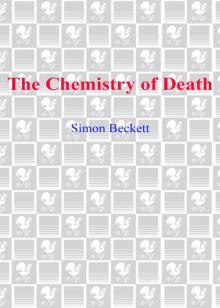 The Chemistry of Death
The Chemistry of Death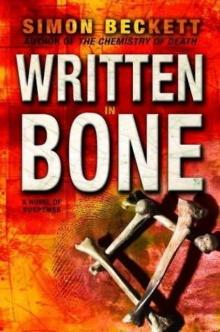 Written in Bone
Written in Bone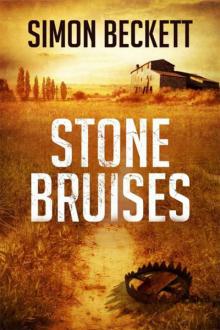 Stone Bruises
Stone Bruises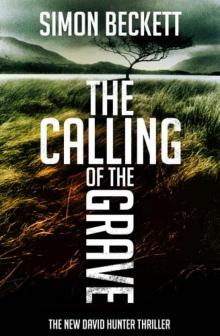 The Calling of the Grave
The Calling of the Grave Whispers of the Dead
Whispers of the Dead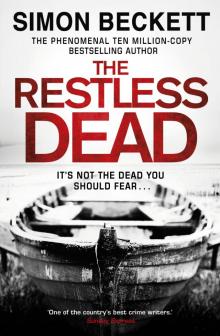 The Restless Dead
The Restless Dead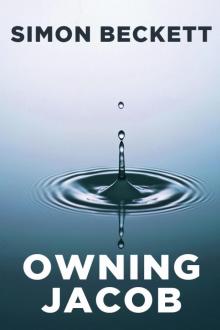 Owning Jacob
Owning Jacob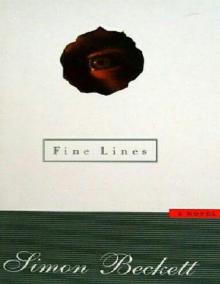 Fine Lines
Fine Lines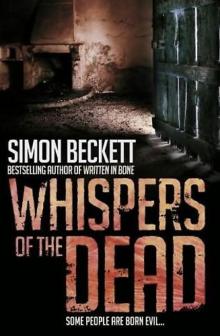 Whispers of the Dead dh-3
Whispers of the Dead dh-3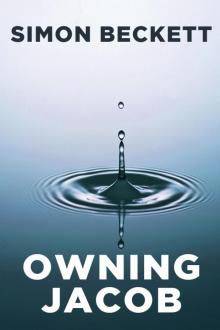 Owning Jacob (1998)
Owning Jacob (1998)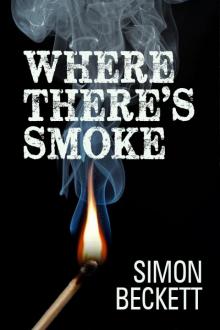 Where There's Smoke (1997)
Where There's Smoke (1997)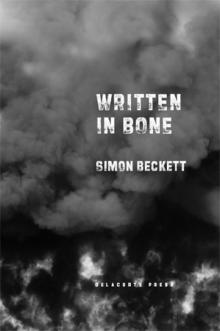 Written in Bone dh-2
Written in Bone dh-2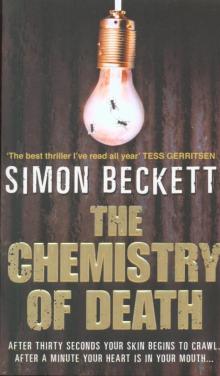 The Chemistry of Death dh-1
The Chemistry of Death dh-1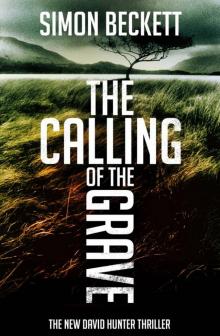 The Calling Of The Grave dh-4
The Calling Of The Grave dh-4